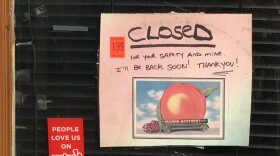Massachusetts is still reporting dozens of deaths each day from COVID-19. But starting this week, you can get a haircut, buy some marijuana and go to the beach. Just make sure to keep some social distance.
A lot of businesses were closed Monday because of the Memorial Day holiday, but — legally — a few industries were now allowed to resume operations.
Matt Murphy, State House News Service: This is technically the start of the second week of phase one. But you're right, this is the big sort of second phase of phase one, if you'll allow me to use the term again.
We are seeing a lot of new types of businesses get the green light to open Monday. And this is everything from barber shops and retailers — who can start to do curbside pickup — to dog groomers and car washes and businesses like these. So a lot of people really have had over the past week to review the safety protocols that the governor put in place, and get their businesses ready to open. And this is going to include a lot of mask wearing, a lot of social distancing at all of these businesses.
As we move towards the next phase, and as I said, because we're one week into phase one, every phase, according to the governor's plan, will last a minimum of three weeks. So we could be two weeks away from the start of the second phase. It could be longer, depending on some key metrics. And what the governor is looking for is to see positive progress on things like the state's positive test rate, or the number of people who've died from COVID-19, the number of patients in hospitals, as well as testing capacity, and the contact tracing program that the state is trying to set up so that they can monitor and respond to hot spots, should there be outbreaks in specific parts of the state moving forward.
Carrie Healy, NEPR: Last week we saw the April unemployment rate for Massachusetts. That was a staggering 15.1%, a record by far. According to employers, many of those layoffs are supposed to be temporary until they can reopen again. So how much pressure is the governor getting to reopen some of those hardest hit industries, like restaurants?
Yeah, there's no doubt that there's been pressure on the governor to reopen. It's coming from sectors like the restaurant sector, from the retail sector, but it's also economy-wide. I mean, there's so much widespread unemployment and this is impacting families. It's impacting the state's finances. And there's a concern that the longer you keep the economy shut down, the longer-term consequences it could have, and the more difficult it will be to rebound.
But the governor is trying to approach this from a public health safety standpoint. And you mentioned the restaurants, it's interesting. The restaurants are seeking some assistance as they get ready, and other states have opened restaurants around us, in New Hampshire, Connecticut, Rhode Island.
But Massachusetts restaurants are seeking some assistance from the state legislature to begin to perhaps amend their licenses, for instance, to allow outdoor alcohol sales so they could do patio service, outdoor dining as the weather gets nicer. So there's a couple of components to this, and the state doesn't seem quite ready for restaurants to reopen just yet.
We talked last week about a special election here in western Massachusetts for state Senate. That seat and another, which both had been held by Republicans, went to Democrats, leaving the GOP with just four seats in the 40-member state Senate. Matt, is there any relevance to the minority party in the Senate at this point?
I mean, it's tough to draw conclusive lessons from these elections. A number of things are going on here. Special elections are difficult because turnout tends to be low. These were the first conducted in this pandemic with mail-in voting.
But there are also some things we saw, particularly in a race on the South Shore and the upper Cape Cod area, where Republican Jay McMahon ran a very conservative campaign. He was very closely aligned with President Donald Trump. He participated in a lot of these "reopen the economy" rallies and stood apart from a very popular governor, Charlie Baker. And he lost, losing the seat for the Republicans.
In western Mass., a slightly different situation. You had a much better-known Democrat, a veteran and state representative John Velis, running for the seat that Don Humason had held in Westfield. He was running against a Republican John Cain, who actually had the support of the Republican governor, but he was unable to overcome that sort of name recognition in a special election like this.
But certainly, the fact that the Republicans — who had been on the rise in the Senate, up to six members —back down to four, limits their ability to effectively push an agenda. Thankfully for the Republican Party in the Senate, Senate Minority Leader Bruce Tarr has a very good working relationship with Democrats, so he should still be able to get some things done.





